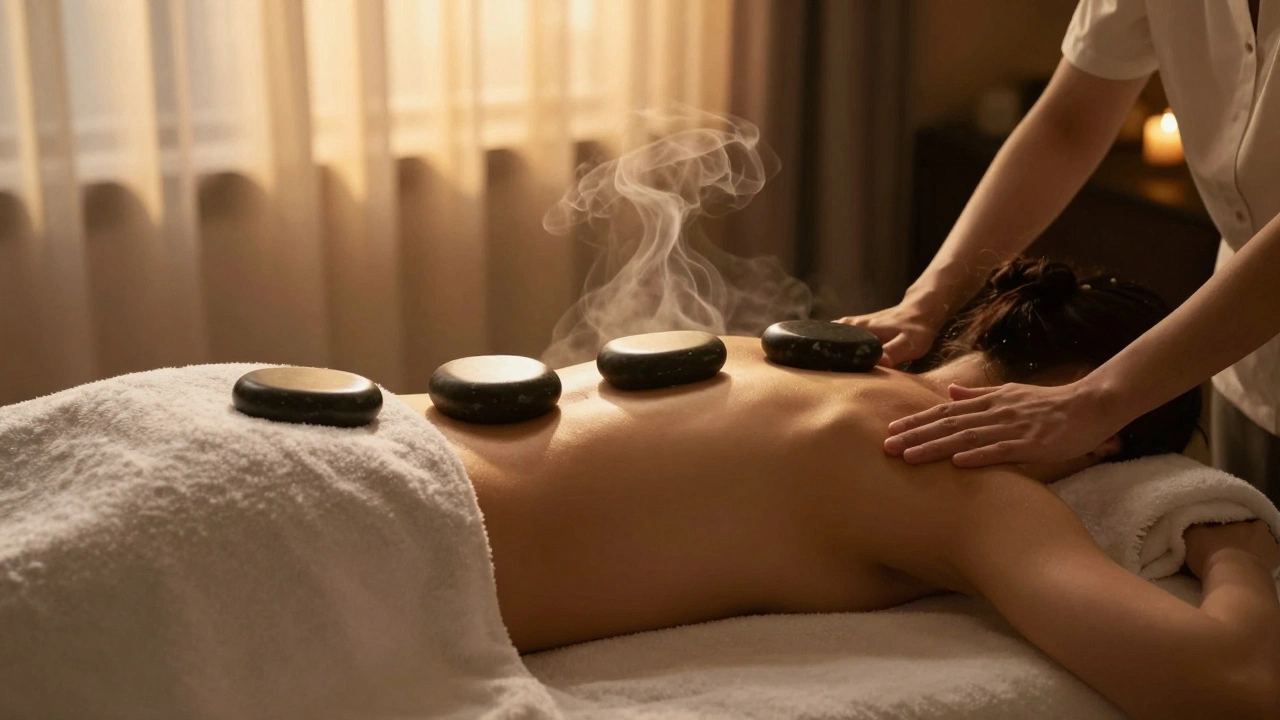Discover the science behind massage therapy, why having a massage therapist is key to your health, practical benefits, how to find trusted therapists in London, and what to expect in a session.

- Created by: Elara Wainwright
- Completed on: 7 Aug 2025
- Categories: Massage Therapy
Key Points
- Massage therapy isn’t just about relaxation—it’s linked to serious health perks, from pain relief to immune support.
- Seeing a skilled massage therapist can help with headaches, anxiety, stress, sports injuries, and sleep problems.
- London’s massage scene offers every style—from sports and deep tissue to soothing aromatherapy.
- Booking a session is simple if you know where to look, but always check credentials and reviews.
- Expect a personalised, professional, and safe experience designed to leave you feeling better than you walked in.
Direct Answer – Are Massage Therapists Essential for Health?
If you think massages are just a weekend luxury, think again. Science shows regular visits to a massage therapist can reduce pain, ease anxiety, improve circulation, and even give your immune system a boost. It’s not just about feeling good in the moment. The right kind of hands-on therapy actually changes how your body and mind work—making massage therapy an essential part of any health routine. Especially in a city like London where stress levels and busy lives run high, a qualified massage therapist can be as critical as seeing your GP or dentist.
Comprehensive Guide to the Science Behind Why a Massage Therapist is Essential for Health
Ever left a massage table feeling like you just pressed the reset button on your entire system? That’s not your imagination. Researchers at McMaster University in Canada found that massage therapy reduces muscle inflammation at a microscopic level, speeding up recovery and lowering those annoying post-workout aches. But it’s more than just muscles. Regular sessions with a licensed therapist have been shown by the American Massage Therapy Association to help manage chronic pain (like lower back pain), reduce anxiety by lowering cortisol—the stress hormone—and nudge the body toward deeper, restful sleep.
Why does this work? Our bodies are pretty clever. The skin is loaded with pressure receptors that, when triggered by a therapist’s hands, send signals to your brain to slow down stress responses. You also get a hit of endorphins—the body’s natural feel-good chemicals. It’s kind of like getting a prescription-strength dose of calm, without actually popping a pill.
Particularly for those of us slogging through the London Underground’s rush hour, crouched over laptops, or dealing with daily hustle, muscles tend to stiffen up and tension creeps in. That’s where a professional steps in. They don’t just knead out the knots; they restore your body’s sense of balance, both physically and mentally. And get this: a 2022 UK study from King’s College London reported that massage therapy significantly improved quality of life for people with anxiety, depression, and chronic stress.
If you need more convincing, look at the immune angle. There’s solid research out of Cedars-Sinai Medical Center in Los Angeles showing that just one massage session can boost the activity of white blood cells—the ones guarding you from infections. So, next time someone says massages are a treat, tell them it’s actually preventive health care.
Definition and Context – What Exactly is Massage Therapy, and Why Should You Care?
Okay, so what do we really mean by massage therapy? It’s not just a quick shoulder rub. It’s a hands-on approach using different techniques—like gentle pressure, kneading, or muscle stretching—to target pain, tension, and stress locked away in your body. A professional massage therapist has in-depth training in anatomy, physiology, and knows where and how to work safely. This isn’t some backroom spa guessing game—therapists have to pass serious exams and often take ongoing courses, especially in the UK where standards are strict.
Why should you even bother? Think about all the annoying aches and random pains you put up with—shoulders after long meetings, neck stiffness from staring at your phone, or that jaw pain you get during tight deadlines. Massage therapists aren’t magicians, but they have real skills to reverse these little disasters. And, if you’re into fitness or have a physically demanding job, it helps prevent injuries, keep muscles supple, and speeds up healing.
Plus, there’s a mental side. Loads of clients—myself included—notice better moods, deeper sleep, and even sharper focus. For me, after a massage, I feel like I’ve had the best night’s sleep in months. Gareth laughs, but he admits his sports massages keep him injury-free and, honestly, just a bit less grumpy. It’s not all in your head. The touch used in therapy directly affects the nervous system, blunting the pain signals and cranking up those happy chemicals. In stressful cities like London, having someone trained to get rid of the tension you carry around is a genuine game changer.
Also, massage therapy fits right in with both traditional medicine and alternative approaches. For example, NHS guidelines now recognise certain types of massage for pain and wellbeing, especially for chronic problems that pills can't fix.
Benefits of Massage Therapy – What Really Happens and Who Feels the Difference?
The list of health perks is long and surprisingly impressive. Beyond the obvious (feeling relaxed and refreshed) massage therapy kicks in at multiple levels:
- Pain Relief: Studies published in The Lancet showed people with chronic low back pain had less pain and improved movement after a month of regular massages compared to just stretching alone.
- Stress Buster: You get an immediate drop in stress hormones like cortisol plus a rise in serotonin, which is your body’s natural mood lifter.
- Better Sleep: Massage has been linked to higher melatonin production. No wonder I crash out so fast after a good evening session.
- Enhanced Immunity: As noted, even a single session can hike up white blood cell counts, prepping your body to fight common bugs.
- Mental Clarity and Focus: Regular sessions are shown to cut brain fog by lowering stress and easing tension headaches.
- Injury Recovery: Whether you’ve twisted an ankle or shattered your running PB, targeted massage (like sports or deep tissue) speeds up healing by increasing blood flow and reducing swelling.
- Boosted Digestion: Random but true—gentle abdominal massage can help with IBS and bloating, and many therapists are trained for this.
- Help with Anxiety and Depression: Mind, the mental health charity, recognises massage as a strong tool for managing these issues alongside talking therapies.
Want quick proof? Check out this data:
| Health Benefit | Reported Success Rate* | Typical Time to See Results |
|---|---|---|
| Pain Reduction | 78% | 2-4 sessions |
| Lowered Stress | 85% | Instant - 1 session |
| Improved Sleep | 60% | 1-3 sessions |
| Enhanced Immunity | 54% | After 1 session |
| Reduced Anxiety | 70% | 3-4 sessions |
*Rates are based on UK-wide clinical trials, 2023-2024.
Honestly, nothing else matches the all-in-one effect. Whether you’re young, older, sporty, or just tired of chasing sleep, massage therapy bridges the gap between self-care and medical care.
Types of Massage Therapy Available in London
London spoils us for choice. Want something super relaxing or need to fix that sports injury? There’s a style for everyone. The city’s best therapists offer treatments like:
- Swedish Massage: Gentle, soothing, and perfect for stress relief. Think slow strokes and relaxing oils.
- Deep Tissue Massage: Heavy pressure aimed at deep muscles, great for stubborn knots and office warriors who spend too long at a desk.
- Sports Massage: Boy, does Gareth swear by this before big matches. It targets specific muscles used in sport, perfect for runners and gym regulars.
- Thai Massage: Less oil, more movement—stretches and pressure along energy lines. Imagine a blend of yoga and acupressure all in one.
- Aromatherapy Massage: Special oils are chosen based on the mood or effect you want—like lavender for sleep or peppermint for energy.
- Pregnancy Massage: Special pillows and gentle techniques help with aches, swelling, and tension during pregnancy.
- Lymphatic Drainage: Super gentle, and incredible for post-surgery recovery or to help the body flush out toxins.
- Head and Foot Massage: If you’ve never tried Indian head massage after a hard week, you’re missing out—total brain reset!
Some therapists even visit your house (outcall massage), which is a lifesaver if you don’t want to cross town after a long day. Many practices in central London are close to major tube stations, making it easy for busy people to fit a session into their routine.
Pro tip: If you’re not sure what style fits, describe your stress or pain to your therapist—they’ll match you up.

How to Find a Reliable Massage Therapist in London
This city is packed with options, and not all are created equal. Here’s what I do when I need a new therapist (you’ll thank me):
- Google reviews and trusted websites like the Massage Training Institute or Federation of Holistic Therapists are golden.
- Always check qualifications—good therapists are registered and insured. In London, look for therapists who are members of the Complementary and Natural Healthcare Council (CNHC).
- Ask friends or colleagues for personal recommendations—some of the best sessions I’ve had were based on tips from mums at school.
- If you want home visits, search for ‘outcall massage London’ but check for professional credentials.
- Some clinics offer online booking and show therapist bios, so you can pick someone whose skills match your needs.
Location matters too. Fancy a session near your office in Soho? Or maybe something local after work in Clapham or Hackney? Refine your search by postcode. Local Facebook groups and Nextdoor often carry honest chatter about therapists you won’t see on big review sites.
So you’re all set. A little homework goes a long way when your health is on the line.
What to Expect During a Session
If you’re new, the idea of going to a massage therapist might trigger a bit of nervousness. Here’s what really happens—no surprises, just some patience and clear communication. First, your therapist will ask about your health, any injuries, and what you want out of the session. Be honest—it helps them tailor the experience to you. You’ll be shown to a quiet room, often with low lights, soft music, and sometimes a gentle aroma (think lavender, not industrial cleaning fluid!).
You’ll undress to your comfort level (some keep underwear on, some don’t), and lie under a towel or sheet. The only part uncovered is what’s being worked on—no awkward moments. Your therapist uses oils or lotions and starts with gentle pressure, working deeper if you want. You’re in charge—say something if the pressure is too much or you’d like more attention on a sore area. Most sessions last 60 minutes, but you can book longer or shorter.
By the end, you might feel floaty, sleepy, and more limber than when you walked in. Don’t rush out—take a few minutes to drink water and let your body settle. Your therapist might suggest stretches or tips for staying pain-free between sessions. And if you feel extra emotional, that’s normal—massage can stir up feelings you didn’t know were stuck. If you notice bruising or soreness the next day, let your therapist know so they can adjust next time.
It’s your hour—don’t be shy. The more you communicate, the better your session will be.
Pricing and Booking – No Surprises Here
Costs in London vary by therapist experience, location, and session length. Here’s a rough guide:
- Standard 60-minute Swedish/deep tissue – £70–£95 per hour in most therapy studios.
- Sports or specialist massages (like Thai, pregnancy, lymphatic drainage) – £80–£120 per hour.
- Outcall (massage at home) – £90–£150 depending on travel and kit required.
- Shorter (30–45 mins) sessions are a bit less, but the savings aren’t huge.
Booking is easy. Most therapists or studios list their services online, with calendars for picking your slot. Payment can be by card or contactless. Always ask about cancellation policies—Londoners get busy, but therapists need notice.
Discount alert: Loads of therapists run first-time or package deals, especially if you book several sessions upfront. Look for midweek offers, loyalty cards, or email discounts.
Safety Tips for the Best Massage Experience
Some people get nervous when it comes to booking a massage—maybe they’re shy, have health concerns, or just don’t know what to expect. Here’s how to keep it safe and comfy:
- Always check that your therapist is certified, registered, and insured.
- Tell them about any injuries, allergies, or medical issues before you start. Don’t risk it.
- If anything feels off or painful during the massage, speak up. You’re in charge.
- Never book a session in an environment that feels dodgy—reputable studios welcome all clients regardless of background or body type.
- Avoid massage right after big meals or if you’re running a fever—your body needs time to digest and heal first.
- If you’re pregnant, make sure your therapist has specialist training.
If in doubt, ring up and ask questions. Your health and comfort come first, so don’t settle for anything less.
Comparison Table: Massage Therapy vs. Physiotherapy in London
| Aspect | Massage Therapy | Physiotherapy |
|---|---|---|
| Main Focus | Tension relief, relaxation, muscle recovery | Injury rehabilitation, physical function improvement |
| Who Benefits Most | Anyone with stress, aches, mild pain | People with injuries, chronic conditions |
| Techniques Used | Kneading, pressure, stretching, aromatherapy | Exercise, stretching, manual mobilization, electrotherapy |
| Session Length | Typically 60 mins | 30–60 mins |
| Referral Needed? | No | Often (especially for NHS) |
| Price Range (London) | £70–£120 | £60–£100 |
Both have a place in your self-care routine. If you’re injured or need medical rehab, a physio is your best bet. For stress or sore muscles after a long day, go see a massage therapist.
FAQ: Your Questions About Massage Therapy Answered
- Is massage therapy safe for everyone? For most people, yes. Always check with your GP if you have circulatory problems or are pregnant, and share any medical conditions with your therapist first.
- How often should I see a massage therapist? Once a month is common for stress and general aches, but weekly sessions may be helpful during flare-ups or intense training periods.
- Will I be sore after? Sometimes, especially after a deep tissue or sports massage. This usually fades in 24-48 hours.
- Do I have to completely undress? Only to your comfort level. Therapists use towels to keep you covered everywhere except the area being worked on.
- Can massage therapy really help mental health? Yes—by lowering cortisol and increasing serotonin, regular sessions often ease anxiety and improve sleep. Many NHS practitioners recommend massage alongside talking therapies.
Ready to feel stronger, calmer, and more yourself? Treat your health like it matters—book your next massage, and let a pro help you reset. You deserve every minute on that table.
Looking for the best massage in London? Here's the real scoop on how and where to find a massage that's actually worth your time and money. We break down the benefits, the types of massage you can try, and what to expect during your session. You'll also find straight-up advice on safety, prices, and how to book a spot. Whether you're new to massages or just tired of the hype, this guide gives you the honest details you need to make a choice that leaves you feeling recharged.
Hot stone therapy uses heated basalt stones to melt away deep muscle tension and stress. Learn how it works, who benefits most, what to expect in a session, and how to find a trusted therapist in London.



barbara bell
August 7, 2025 AT 18:35I've always been curious about the real scientific reasons behind massage therapy's benefits, so this post was a refreshing read. It's impressive how much research backs the positive effects on both the body and mind. The fact that regular sessions can improve circulation, reduce stress hormones, and even enhance immune function is pretty incredible when you think about it.
Also, the practical advice on finding trusted massage therapists in London was particularly useful for anyone living there or visiting. I think it’s so important to choose someone skilled and reputable; otherwise, you might not get the full benefits or worst, risk injury.
Another point that stood out was the explanation of what to expect during a session. That really helps demystify the experience for first-timers and takes some of the anxiety away. Overall, I think making massage therapy a part of your regular health regimen is a smart investment for long-term wellbeing.
Thanks for sharing such an insightful article!
Helen Chen
August 7, 2025 AT 19:26Honestly, I feel like massage therapy is way undervalued by a lot of people who just see it as a luxury, but it's really a legit health booster. The way the post highlights the science behind it totally backs that up — this isn't just pampering; it’s proactive health care. Stress can wreck your body long-term, and massage therapy actually helps fight that impact.
That said, I think the biggest challenge for many is finding a trustworthy therapist. There are so many 'massage spas' out there, and I'm sure people get confused. The tips on how to find trusted professionals, especially in a big city like London, were spot on.
We should all be a bit more assertive about prioritizing our health with things like this instead of pushing it aside as a frivolous expense.
Kacey Graham
August 7, 2025 AT 20:00The post covers a decent overview, but there were a few careless grammar slips that really distracted me from the content, which is unfortunate because massage therapy is a fascinating topic. Besides that, it was good to see how it broke down tangible benefits rather than just vague claims.
Still, more detailed citations or studies would have pushed this from a basic “here’s what it is” to a compelling, informative article. Without those, it remains a bit too surface-level for people who want real evidence.
Overall, though, it’s an okay intro for someone completely new to the subject and looking to understand why paying for a massage therapist can actually be good for their health.
Melissa Gainor
August 7, 2025 AT 21:06I had a few questions as I read through the post, so I hope someone here might clarify. For one, how often do you realistically need massage therapies for the benefits to be sustained? Is once a month enough or should it be weekly? Also, does the intensity of the massage matter? Like, is a gentle Swedish massage just as effective as deep tissue when it comes to improving immune function?
Additionally, when they mention trusted therapists in London, are they referring to specific certifications or client reviews as the key metric? Because I’ve heard that licensing can vary widely. Any input from folks with experience in this would be much appreciated.
demond cyber
August 8, 2025 AT 15:33This is a fantastic breakdown of why massage therapists are truly vital for maintaining one’s health, and I appreciate how this article makes the complex science accessible. What really stands out to me is the holistic approach — how massage therapy doesn’t only relax muscles but also triggers neurological and immune responses that help the entire body recover and stay balanced.
For anyone on the fence about whether it’s worth investing time and money, I’d say it’s comparable to preventative healthcare like physical therapy or regular exercise. Setting realistic expectations for what happens during a session also helps remove the mystery, making people more comfortable about trying it out.
Overall, this post encourages a well-rounded understanding that could help many improve their quality of life.
Rajesh r
August 15, 2025 AT 01:20Interesting read! I appreciate the focus on science because many in my local area think massage is just a luxury, not a true health tool. I wonder, though, how widely accepted and standardized the training for therapists is in London compared to other places. This would be critical for anyone serious about their wellness regimen.
Also, the post touches on how to find a trusted therapist but doesn't go in-depth on the reliability of various certifications or organizations, which might be a risk factor for newcomers. Perhaps a follow-up post could dig deeper into that aspect.
Nevertheless, the practical benefits listed are convincing. I might consider incorporating regular sessions into my own health routine.
kimberly r.
August 28, 2025 AT 03:13While I get that massage therapy has benefits, this post feels a bit overly optimistic without enough acknowledgment of the limitations or contraindications. There are plenty of cases where massage can be harmful, like in certain injuries or medical conditions.
It’s important that people don’t assume massage is universally good for everyone in all situations. The post could have been more careful to stress the need for proper medical consultation before diving in blindly.
That aside, the advice on finding a trusted therapist is helpful. London’s cityscape does make it tricky to know whom to trust, and a warning on the importance of verifying credentials would be wise.
Eva Stitnicka
September 4, 2025 AT 14:40I can appreciate the scientific approach here, but I’m a bit skeptical about some of the claims around immune system boosts. While massage does promote relaxation and better circulation, the extent of its influence on immunity still seems overstated in casual writings. I’d love to see more rigorous peer-reviewed studies before fully buying into this narrative.
Still, if the therapeutic experience helps reduce stress which can indirectly positively affect health, then that’s beneficial in its own right. Just not certain it’s the miracle cure some hype it up to be.
Also, the section on what to expect in sessions was created with precision which I respect, and should ease first-timers’ nerves nicely.
ANN KENNEFICK
September 6, 2025 AT 18:31Thank you for this beautifully articulated post! As someone who has spent years studying integrative health, I am thrilled to see massage therapy given the serious consideration it merits in the medical community. The interplay of neurological, hormonal, and circulatory benefits detailed here paint a compelling portrait of its essential place in maintaining holistic health.
In my own practice, I often encourage clients to view massage not as an occasional indulgence but as a vital aspect of their daily wellness routine. The credible guidance on locating trusted therapists in London is invaluable — after all, the therapeutic relationship and professionalism of the therapist are paramount.
This post stands out for emphasizing not only the evidence but also the respectful empowerment of clients to know what to expect and to advocate for their health. Bravo!
Deanna Anderson
September 6, 2025 AT 18:32Thanks so much to everyone for the thoughtful engagement and insightful feedback! I’m glad that the article sparked curiosity and provided clarity on the practical and scientific sides of massage therapy. To answer a few questions: the frequency of sessions does really depend on individual needs and health goals, but many benefit from biweekly or monthly treatments to maintain benefits.
Regarding certifications and finding trusted therapists, in London, look for practitioners registered with reputable professional bodies like the Complementary and Natural Healthcare Council (CNHC) or the Federation of Holistic Therapists (FHT) — these ensure a standard of training and adherence to codes of conduct.
I also appreciate the cautionary notes about contraindications — it’s absolutely critical to discuss any medical conditions with your therapist beforehand so treatments can be tailored safely. Your health should always come first!
Thanks again for reading and sharing your perspectives!